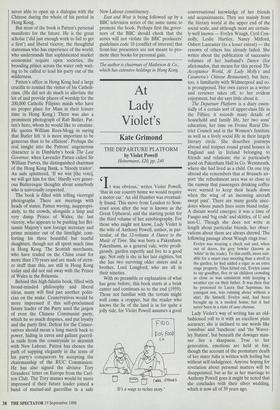At Lady Violet's
Kate Grimond
THE DEPARTURE PLATFORM by Violet Powell Heinemann, f20, pp. 240 It was obvious,' writes Violet Powell, `that in our country home we would require a motor car.' An old Humber was eventual- ly found. This move from London to Som- erset soon after the war is known as the Great Upheaval, and the starting point for the third volume of her autobiography. For those who might not know, Lady Violet is the wife of Anthony Powell, author, in par- ticular, of the 12-volume A Dance to the Music of Time. She was born a Pakenham. Pakenhams, as a general rule, write prodi- giously, garden expertly and live to a good age. Not only is she in her late eighties, but she has two surviving older sisters and a brother, Lord Longford, who are all in their nineties.
With no preamble or explanation of what has gone before, this book starts at a brisk canter and continues so to the end (1959). Those not familiar with the terrain might well come a cropper, but the reader who knows the lie of the land is in for quite a jolly ride, for Violet Powell assumes a good conversational knowledge of her friends and acquaintances. They are mainly from the literary world at the upper end of the social scale, and although most are certain- ly well known — Evelyn Waugh, Cyril Con- nolly, Leslie Hartley, Nancy Mitford, Osbert Lancaster (to a lesser extent) — the renown of others has already faded. She writes about the publication of successive volumes of her husband's Dance (for aficionados, that means for this period The Acceptance World, At Lady Molly's and Casanova's Chinese Restaurant), but here, too, a familiarity with Widmerpool and co. is presupposed. Her own career as a writer and reviewer takes off, to her evident enjoyment, but she says little about it.
The Departure Platform is a diary essen- tially of a certain sort of upper-class life in the Fifties; it records many details of household and family life, her two sons' education, her time on Frome Rural Dis- trict Council and in the Women's Institute as well as a lively social life in their largely literary circle. She describes journeys abroad and traipses round grand houses in England and in Ireland belonging to friends and relations; she is particularly good on Pakenham Hall in Co. Westmeath, where she had lived as a child. On one trip abroad she remembers that at Brussels air- port 'the refreshment area was so close to the runway that passengers drinking coffee were warned to keep their heads down when the wing of an incoming aircraft swept past'. There are many gentle anec- dotes whose punch lines seem bland today. A distant world emerges; it was a time of Fangio and 'big ends' and skittles, of U and non-U. Though she does not write at length about particular friends, her obser- vations about them are always shrewd. The following passage about Waugh rings true:
Evelyn was wearing a check suit and, when out of doors, his grey bowler (known as `white' in the trade). To this outfit, more suit- able for a smart race meeting than a stroll in the garden, he had added a cigar as an extra stage property. Thus kitted out, Evelyn came to say goodbye, five or six children crowding as close as was consistent with keeping a weather eye on their father. It was then that he protested to Laura that Septimus, his youngest son, was running about without a shirt. He himself, Evelyn said, had been brought up in a modest home, but it had never been in a state of sans chemise.
Lady Violet's way of writing has an old- fashioned roll to it with an excellent plain accuracy; she is inclined to use words like `omnibus' and 'luncheon' and 'the Waver- ley Station', but beneath the dowager man- ner lies a sharpness. True to her generation, emotions are held at bay, though the account of the premature death of her sister Julia is written with feeling but without self-indulgence. Anyone hoping for revelation about personal matters will be disappointed, but as far as her marriage to Anthony Powell goes it might be noted that she concludes with their silver wedding, which is now all of 39 years ago.










































































 Previous page
Previous page